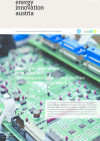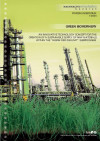Suchergebnisse für "Factsheet: Energietechnologien gestalten, die für alle sinnvoll und nutzbar sind"
VITALITY District - Optimized energy concepts in the early planning phase of resilient, energy-efficient neighbourhoods
The aim of the VITALITY District project is to coordinate the total (electrical and thermal) load and generation profile in the design phase of urban areas and neighbourhoods in order to optimize the energy concept of energy-efficient districts. Hence smart city indicators in detailed level (buildings, individual technologies, public spaces) as well as models, principles and catalogs of criteria for energy-optimized urban neighbourhoods are going to be created. The results are going to be presented in compact form on the district level in order to serve as input for future urban planning projects.
Cooperative Refurbishment

Models for participation of owners and tenants in ecological refurbishment of multi floor buildings
PH Office - Criterions for energy-efficient office buildings
The passive house standard and energy-efficient building technologies are getting increasingly important for office buildings, too. However, standardisation is not completed on the same level as known from the residential building sector. The project at hand brings in definitions and makes a suggestion on a standardised calculation method for office buildings in passive house quality.
Smart grid innovations from Austria

New components and storage facilities for tomorrow‘s energy supply system.
energy innovation austria
2/2018
Herausgeber: BMVIT und Klima- und Energiefonds
Englisch, 8 Seiten
Downloads zur Publikation
plusFacades - International know-how- and knowledge transfer of "intelligent Facade systems" for Austrian players and key personnel
The project proceeds from the idea that prefabricated intelligent facade systems represent a promising technology for the energy efficient refurbishment of buildings. A goal is to process the present international state-of-the-art and the existing know-how to this topic for Austrian experts.
Eco-textiles - from the eco-niche into the trend market!
Optimum communication strategies and motives for the purchase of eco-textiles by specific target groups are investigated. The results are reviewed with respect to the transferability to other branches of sustainable production and marketing. Aim of the project is to foster the supply of eco-textile products and thereby promoting the Austrian eco-textile producers and retailers.
Stanz+ - An innovative, energy-flexible plus-energy district - the centre of the village Stanz
Stanz+ is working on the implementation of an energy strategy for structurally weak municipalities with specific measures for revitalisation and re-densification in the building stock as well as the integration of renewable energy sources in the municipality of Stanz im Mürztal (Styria). The project includes multipliable approaches towards energy autonomy, hybrid use of energy networks for flexible usage and an energetic revitalisation of the village centre with the involvement of users in the "Rural Pioneers Community" for the usage of energy services.
Green Biorefinery

An innovative Technology Concept for the Creation of a Sustainable Supply of Raw Materials within the "Fabrik der Zukunft" Subprogram
Forschungsforum
1/2004
Herausgeber: BMVIT
Englisch, 6 Seiten
Downloads zur Publikation
IRONER - Potential for innovative and sustainable recycling of steel
Within the framework of the IRONER project, open questions were identified and the necessary innovations for increased steel recycling were developed. In addition to a material flow analysis, stakeholder interviews and ecological and economic considerations, the influences of increased steel recycling on metallurgical processes and material properties of steel products were examined.
greenWATERrecycling – utilization of greywater for energy recovery and for providing greywater-filtrate for watering green walls
Development of a system for energy-recovery of waste heat of greywater and of greywater-filtrate in ordert o reduce the energy consumption of hot water supply and the water consumption for irrigation.
KityVR - Artificial intelligence techniques to implement CityGML models and VR visualization
The goal of the project is to link 3D city models and virtual reality for energy-relevant applications as key-enabler for digital planning, construction and operational management. Missing data will be calculated using statistical enrichment methods.
Sustainability Reporting - Guidelines for Sustainability Reporting based on reporting processes of VA Technologie and Österreichische Bundesforste
Scientific attendance of sustainability reporting processes in two partner enterprises (VA Tech and ÖBf AG). Development of the guideline "Reporting about Sustainability" based on these practical experiences.
Energy Services as an Integral Part of the Distribution
Concept development for the implementation of efficient energy services as part of grid connected energy supply to increase energy end-use efficiency.
Conference: Smart Grids Week - Graz 2014
May 19th to 23rd, 2014
Energie Steiermark and CONGRESS GRAZGraz, AT
The Smart Grids Week - Graz 2014 aims to significantly contribute to the further development of electricity infrastructures and to link the Austrian Smart Grids activbities with the European initiatives.
Integrated ecological and energy-oriented refurbishment of service buildings - development of quality criteria and tools within a pilot project (LCC-ECO)

Formulation of a procedure for the general refurbishment of service buildings and development of guidelines to support building owners and facility-managers in each stage of the refurbishment process in order to reach an integrated ecological and energy-oriented refurbishment.
Benchmarking - sustainability of housing subsidies across the federal provinces

Systematical description, analysis and comparison of all ecological, economic and social sus-tainability of the systems aspects of housing subsidy for new buildings and the renovation of buildings across the federal provinces of Austria; an analysis of regional-economic effects and a statistical-econometric analysis of the allocation effects of housing subsidies.
Itz Smart – Carbon neutral city district development Itzling – Implementing innovation and technology via co-operative process design
The goal of the project “Itz Smart” is to tie in with existing activities and to consistently develop Itzling as a residential location further. In the test and demonstration area, sustainable residential quarters with trendsetting solutions for mobility are developed in the zone of the transport axis (railway and Schillerstraße) and along the local supply axis (Itzlinger Hauptstraße). The consideration of housing and mobility with regard to the aspect of “city of short ways“ also entails a discussion of determined mixed utilisation and the development of such residential quarters.
StromBIZ - demonstration projects: business models for decentralized electricity generation and distribution
Feasible business models to utilize locally generated renewable energy are expected to induce a tipping point for the "Energy Turnaround" in Austria. Within the proposed project a number of demonstration PV plants on residential and non-residential buildings had been realized. On this basis new approaches of business cases had been developed, implemented, tested and disseminated.
BIMBestand - BIM-based management of existing buildings
The objective of this research project is to develop information requirements and process descriptions for the application of BIM models related to building services in facility management and to demonstrate the lifecycle-oriented use of these models in an open BIM environment. For this purpose, software solutions for the use of IFC in the open-source platform SIMULTAN and building management software are developed and evaluated on the basis of four typical use cases.
LenA circular houses - Demonstration of the circular architecture design process for circular andreuse building based on the lighthouse project LenA
The main objective is to research and demonstrate the positive climate impact of reuse in the construction industry. Through this (re)use of components, products and material groups, large shares of the emissions generated by the construction industry can be avoided and contribute to the targeted climate neutrality. Another aspect is to design the connections of the components in such a way that they can be deconstructed and reused.
